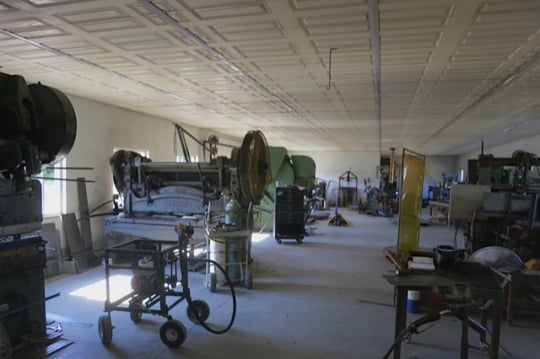Amish Welding Shop
Tom shares a few photos from an Amish welding business in the settlement at Clyde, New York.

Tom describes Schmucker Welding as a “Nice new shop with two very long power shafts and more belts that I have ever seen in one place.”
Shafts and belts can be used to operate a variety of shop tools. But welding takes “real” power. Unlike other Amish-engineered tools, which might be able to run off of air or hydraulic means, actual electricity is needed to weld. Amish welders use electric generators for this restricted purpose.

In The Riddle of Amish Culture, Donald Kraybill writes about generators in the Lancaster community. A few generations back Amish began using them to repair equipment and convert farm machinery for horse-drawn use. But they also started to use them for non-essential purposes, such as operating home freezers and even lighting bulbs in barns.
In response Amish leaders came out against the generator in the early 1960s, with the exception of use for welding. This would let Amish supply themselves with necessary farm implements and help preserve horse-drawn farming (See Riddle pp. 201-202).

Today welders are important in Amish businesses working with metal, such as farm equipment manufacturers or makers of horse stall doors. Welding is even a stand-alone business as in the case of Schmucker Welding here.
“Notice the surplus garage doors used for the ceiling,” Tom notes. “It adds insulation and has a finish so no painting is needed. I have seen many shops build with garage doors in the past.”

Who’s running all the equipment here? The answer might surprise you. Says Tom: “I found it interesting that besides the owner Mahlon Schmucker here was only one employee…a young woman working with these huge machines. I am not sure if it was his wife or a young woman from the community.”

Amish females do sometimes take on manual labor tasks in Amish shops. It’s probably more common that wives chip in from time to time, but women sometimes have full-time jobs operating tools side-by-side with the men.
The first thing that comes to mind in this case is women doing furniture finishing. One Amishman I spoke with felt his female finishers had a precision and attention to detail for the task that, I took him to mean, was harder to find with men.






That is some pretty old equipment in that shop and I’m just a little familiar with a few since I’ve been around some machine shops in the past, but like anything if you take care of something its going to last! And the only employee being a woman I’m sure is a huge asset to this Amish shop owner, and some of the best workers I’ve ever seen were woman anyway! Richard .www.Amishstories.net
Great pictures – I’ve never seen a welding shop so it’s always fun to see new and different things. The garage door ceiling is a first for me, too. Thanks for sharing ~
Richard: Nice to hear a man admit that women are the best workers! Most manual labor jobs with women have found that women slack off alot less than men and will have a better eye to detail than a man.
I have never seen a ceiling done with garage doors before. Interesting. I sure wouldn’t mind learning to d welding and finding a new line of work. I know its dirty and hard at times, but I find that a challange!
LeeAnn no problem......
LeeAnn no problem I just call them as I see them, so I tip my hat to the “power of the woman”. Richard. http://www.Amishstories.net
Women and Power in an Amish Welding Shop
How come whenever I receive Amish America articles, they have already been commented on? Does a select clientele receive them first, or am I THAT slow in checking my email? I know, I’m whining… (pout, pout…) 🙂
Carl, most days you should be getting them in your email a little after 7 am EST, which is when they’re sent out to everyone (unless I am behind schedule that day).
If you’re just getting them now maybe there is something with email delivery? Anyway, we’re glad to hear from you whenever you get to it 🙂
Erik & Tom, thanks for another interesting pictorial post. Tom, thanks for mentioning the garage door ceilings as I probably would’ve overlooked what they were in admiring their details.
Carl, I loved your little funny pout. I never want to be the first or last commenter as I love hearing from everybody.
Great post Erik – I love the garage doors for a ceiling!
Regarding women working in the shop: it reminds me of my time in western China, where it is very common to see women working in manual labor occupations, such as the construction trades. In the U.S., we are very accustomed to seeing women in professional jobs, but see them much less in jobs like construction, welding, etc. I guess this welding shop is an example of the Amish defying our expectations yet again, this time regarding roles of men and women.
I never seen
I never seen this type of big welding factory. Nice picture add some videos to really want to see live things.
Nice Welding factory
This is the first time I see a big welding factory, especially for women. I used to work for my father factory but there are not much women working since they think it is a hard and dirty job only for men. Your factory is really awesome !
The ceiling looks awesome.
The idea of using garage doors for ceiling is just awesome. Now I wonder where I can try this out.
As cool as it is to see how far technology has brought us, it is always refreshing to look back and see where it all started. Some of the mills and presses that I see in this picture are fascinating! It’s good to see that even though technology has taken us this far, what worked in the past still works well enough to help people get what they need. Interesting that generators were banned except for the use of welding.
It’s great to see women in the welding shop! Great article!
Looking for expanded metal that you can put on your wheel chair so that your wheel chair doesn’t slide.
Amish Welding Shop
The Best Trade Careers for Women
1. Construction Technology. Today’s construction industry is an exciting and evolving sector.
2. Construction Management.
3. Electrical Technician.
4. Heating, Ventilation, and Air Conditioning Technician.
5. HVAC Professional.
6. Industrial Maintenance Mechanic.
7. Welder.
I love your page, I do too still doing welding old fashion way...
Is all work and web-design, don’t have time for much I wish I can get a haircut but this Corvid-19 they close down all hair salons.
Looking for a fabrication business interested in building mobile cattle feeders